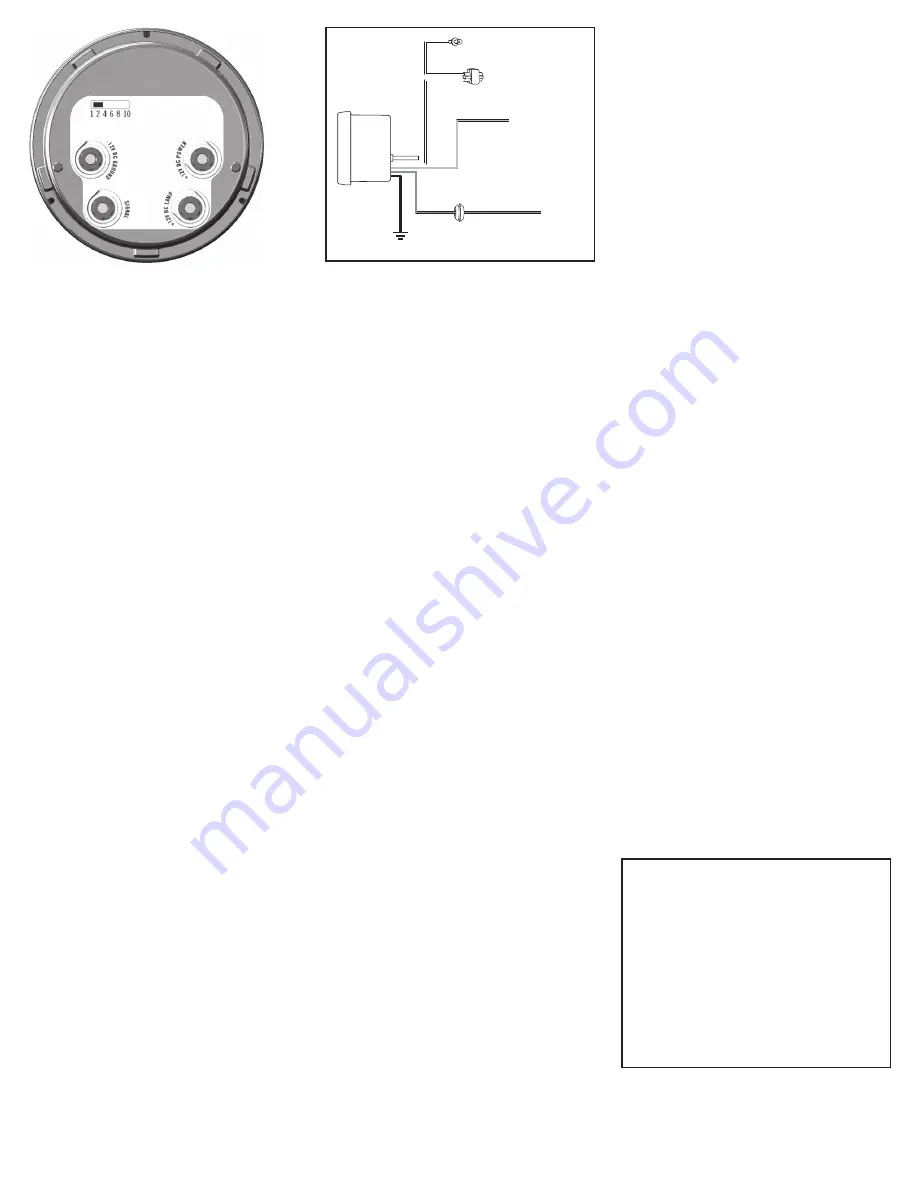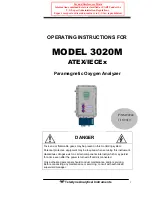
Sunpro is a registered trademark of Snap-on Corporation
used under license by SPX Corporation.
1-800-228-7667
0002-000-3113
FULL ONE (1) YEAR WARRANTY
Sunpro, 15825 Industrial Parkway, Cleveland, Ohio 44135, warrants to the
user that this unit will be free from defects in materials and workmanship for
a period of one (1) year from the date of original purchase.
Any unit that fails within this period will be repaired or replaced at Sunpro’s
option and without charge when returned to the Factory. Sunpro requests
that a copy of the original, dated sales receipt be returned with the unit to
determine if the warranty period is still in effect.
This warranty does not apply to damages caused by accident, alterations, or
improper or unreasonable use. Expendable items, such as batteries, fuses,
lamp bulbs, flash tubes are also excluded from this warranty.
Sunpro DISCLAIMS ANY LIABILITY FOR INCIDENTAL OR CONSEQUEN-
TIAL DAMAGES FOR BREACH OF ANY WRITTEN WARRANTY ON THE
UNIT. Some states do not allow the disclaimer of liability for incidental or
consequential damages, so the above disclaimer may or may not apply to
you. This warranty gives specific legal rights, and you may also have rights,
which vary from state to state.
SWITCHED
+12V
SEE SIGNAL
POST CONNECTION
WIRE
SPLICE
TO DIMMER
SWITCH
LIGHT
WIRE
LAMP INSTRUMENT
GROMMET
WIRE
TO GND
GND
WIRE
SIGNAL
WIRE
+12V
ELECTRICAL CONNECTIONS
CAUTION
For your own personal safety, and to prevent possible
damage to the electrical system of your vehicle during
the installation, disconnect the negative (-) battery cable.
Reconnect this cable after installation is complete. Do
not route wires along or against sharp edges, hot engine
surfaces, or near spark plug wires. If needed, drill a 3/8”
hole in the firewall for the grommet (included).
1. Attach wires to tachometer as required.
NOTE:
Use # 18 or # 20 AWG stranded automotive
primary wire.
2. Thread wires through female nut (2), cup (1), bracket
(4 or 5) and male nut (3). Note: At this point, items 1,
2, 3 and 4 or 5 should have been preassembled.
3. Leave tachometer out of the cup for now.
SIGNAL POST CONNECTION AND CYLINDER
SELECTION
The Cylinder Selector Switch is located on the back of the
tachometer. The factory setting is 8-cylinders. Change
the setting if necessary.
The 4, 6, 8, and 10-cylinder settings are most common
for all distributor equipped engines and Distributorless
Ignition Systems (DIS) with a tachometer output lead.
The 2-cylinder setting is designed for 2-cylinder engines and
DIS systems without a tachometer output lead that allow
access to the driver wires from the vehicle computer
to the ignition module.
The 1-cylinder setting is used with single cylinder engine
vehicles and in conjunction with the
CP7560
Tach Signal
adapter.
The
CP7560
Tach Signal Adapter (sold separately)
senses current pulses in the wire that su12 volts
to the ignition coil primary windings or fuel injector and
converts the pulses to a signal that is understood by the
tachometer. The
CP7560
Tach Signal Adapter is required
to connect the tachometer to Coil On Plug ignition systems
and to diesel engines with electronic injection.
DISTRIBUTOR EQUIPPED ENGINES
Connect the SIGNAL tachometer post to the negative
(-) side of the ignition coil. This terminal may be referred
to as the TACH, TACH TEST, DEC, or ECU terminal.
Set the Cylinder Selection switch on the back of the
tachometer to match the number of cylinders in the
engine.
DISTRIBUTORLESS IGNITION SYSTEM EQUIPPED
ENGINES WITH A TACHOMETER OUTPUT LEAD
Connect the SIGNAL tachometer post to the vehicle‘s
tachometer output lead.
Set the Cylinder Selection switch on the back of the
tachometer to match the number of cylinders in the
engine.
DISTRIBUTORLESS IGNITION SYSTEM EQUIPPED
ENGINES WITHOUT A TACHOMETER OUTPUT
LEAD
If your vehicle’s DIS ignition system does not have a
tachometer output lead but allows access to the driver
wires from the vehicle computer to the ignition module,
connect the
SIGNAL
tachometer post to one of the
driver wires.
Set the Cylinder Selection switch on the back of the
tachometer to the 2-cylinder position regardless of
the number of cylinders in the engine.
MULTIPLE SPARK DISCHARGE IGNITION SYSTEM
EQUIPPED ENGINES
For Multiple Spark Discharge ignition systems, connect
the
SIGNAL
tachometer post only to the tachometer
output terminal on the ignition module. Do NOT connect
to the ignition coil.
Set the Cylinder Selection switch on the back of
the tachometer to match the number of cylinders
in the engine.
COIL ON PLUG IGNITION SYSTEM EQUIPPED
ENGINES
To connect the tachometer to these engines you need
to purchase the
CP7560
Tach Signal adapter. Follow
instructions included with the adapter to hook up wires
and to set the Cylinder Selection switch.
DIESEL ENGINES WITH ELECTRONIC INJECTION
To connect the tachometer to these engines you need to
purchase the
CP7560
Tach Signal adapter. Follow instruc-
tions included with the adapter to hook up wires and to set the
Cylinder Selection switch.
-12V DC GROUND, +12V DC POWER, AND 12V
DC LAMP POST CONNECTIONS
ALL VEHICLE SYSTEMS
1. Connect the post labeled
-12V DC GROUND
to the
negative (-) battery terminal, or a clean unpainted
chassis ground using a ring terminal or other suit-
able means.
2. Connect the post labeled
+12V DC POWER
to any
vehicle harness wire which is energized with battery
voltage, ONLY when the ignition key is in the ON
(RUN) position, NOT OFF OR ACCESSORIES.
3. Connect the post labeled
12V DC LAMP
to the
instrument panel lighting circuit that is controlled by
the instrument panel dimmer control.
Some vehicles (typically imported) wire the dimmer
control into the ground side of the instrument panel
lighting circuit, as opposed to the more conventional
“hot” or 12-volt side. In vehicles which use this circuit,
connect the
12V DC LAMP
post to a circuit which is
energized by the headlamp switch.
INSTALLING TACHOMETER IN CUP
1. Place tachometer in cup. Gently pull wires out, so
they would not be jammed between the cup and
tachometer.
2. Secure tachometer in cup using #8 lock washers
(6) and #8-32 acorn nuts (7). Turn acorn nuts down
finger-tight and, with a wrench or nut driver, tighten an
additional 1/2 turn. DO NOT OVER TIGHTEN.
3. Position cup as desired and tighten male nut (3).




















